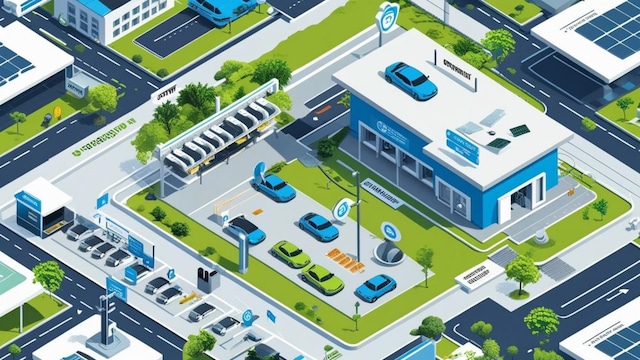Our Terms & Conditions | Our Privacy Policy
Start an EV charging business in India—no license, earn ₹25 lakh yearly
1 / 9
Cost of Setup: The cost of establishing an EV charging station in India ranges from ₹1 lakh to ₹50 lakh, depending on the type of charger. Major expenses include land lease, transformers, electricity connections, civil work, maintenance, marketing, EVSE software, and site contracts. Chargers range from around ₹65,000 for Bharat AC to ₹14 lakh for CCS fast chargers. Space needs vary by vehicle types served and site activities. (AI Image)

2 / 9
Low Staff Requirement: Operating an EV charging station requires few employees. Many companies supply complete solutions—equipment, software, and mobile apps—reducing manpower needs. Payment and billing are managed online, limiting the need for in-person cash handling. This makes it possible to run a station efficiently with a small team focused mainly on safety and customer support.

3 / 9
Licence-Free Operation: According to the Ministry of Power, no licence is required to set up EV charging stations in India. They can be installed in parking lots, highways, or private premises. However, a no-objection certificate from the Forest Department and Municipal Corporation is necessary. All stations must meet the technical and safety guidelines specified by the Ministry. (AI Image)

4 / 9
Potential Earnings: A 3000 kW charging station charging at ₹2 per kWh can generate up to ₹2.25 lakh per month. Income can also come from subscription plans, advertising, and value-added services like cafés or convenience stores. Partnering with nearby businesses can further boost revenue while customers wait for their vehicles to charge. (AI Image)

5 / 9
Government Guidelines: Central government policy requires public charging stations every 3 km in cities, every 25 km on highways for light vehicles, and every 100 km for heavy-duty EVs. Public stations must link with at least one online service provider for booking and remote slot reservations. State governments set service charge limits, and electricity tariffs remain capped until March 2025. (AI Image)

6 / 9
Infrastructure Requirements: Essential infrastructure includes transformers, safety equipment, 33/11 KV cabling, meters, and secure parking. Chargers—rapid, fast, and slow—must meet national and international standards. Adequate security and lighting are required for safety. EV charging is also allowed at homes and offices using existing electricity connections, provided safety rules are followed. (AI Image)

7 / 9
Franchise Opportunities: Franchise investment ranges from ₹1 lakh to ₹10 lakh. Notable franchise providers include Tata Power, Charge+Zone, PlugNGO, Charge My Gaddi, Exicom Power Systems, EVQ Point, Volttie, and Dyna Hi-tech Power Systems. Franchisees benefit from brand recognition, technical assistance, and a built-in customer base, reducing the challenges of starting independently. (AI Image)

8 / 9
Government Support: In March 2023, the government allocated ₹800 crore under the FAME-II scheme to PSU oil companies—IOCL, BPCL, and HPCL—to set up 7,432 public fast-charging stations nationwide. This funding covers up to 60% of infrastructure costs, such as transformers, cables, breakers, and civil work. Completion is expected by March 2024, increasing the network from 6,586 to over 14,000 stations. (AI Image)

9 / 9
Planned Locations: Fast-charging stations will be installed in metros, smart cities, hilly states, expressways, and highways. Sites near offices, hotels, restaurants, and highway rest stops will enable EV users to recharge during travel breaks. This will address range anxiety and make long-distance and intercity EV travel more convenient. (Image: Pixabay)
Images are for reference only.Images and contents gathered automatic from google or 3rd party sources.All rights on the images and contents are with their legal original owners.



Comments are closed.